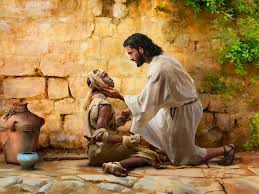HOMILY SUNDAY 06 – B
Holistic Healing
(Leviticus 13:1-2, 45-46; Psalm 32; 1 Cor 10:23-11.1; Mark 1:40-45)
****************************************************************
Fr. Lucien Larré, founder of Bosco homes for delinquent teenagers and well-known speaker and presenter of parish missions, shares an experience he had of a healing. A sister who had worked for him developed MS to the point where she was bedridden and could hardly do anything. One night she dreamt that she was at Lourdes and was healed. Reluctantly, he gave in to her insistence that he accompany her and prayed for two things – that she would not die on the way, and that she would at least accept her illness and die in peace. To his utter amazement and almost disbelief, after a few days at Lourdes, she experienced a complete healing of her illness, proven by her ability to not only walk, but also to swim and eventually, skate. She went on to become provincial superior of her religious community, and he experienced growth in his faith in Jesus to heal.
Like the leper in today’s gospel, we can stir up our faith and come to Jesus for physical, mental, emotional and spiritual healing.
The leper in the gospel was not only in need of physical healing, but also relational healing. We hear in the first reading from Leviticus that once declared ill from leprosy by the priests, the person was separated from the community and had to live outside the camp.
The first reading from Leviticus reveals not just the role of the priests and the law that they were to uphold, but also the limits of the Old Testament priesthood and the Old Testament law. The law could only legislate how leprosy was to be contained – it could not heal. The priests could only certify that a person had leprosy – they also could not heal.
The critical turning point in the Gospel is that the leper puts his faith in Jesus. “If you want to,” he said, “you can cure me.” Immediately, Jesus, the new law, and the new and eternal high priest according to Hebrews, responds in two interesting ways: he both breaks the law, and keeps the law, showing his complete mastery over the law and fulfillment of the law.
 First, Jesus stretches out his hand and touches the leper, knowing full well that the law forbids anyone to even come close to a leper, let alone touch a leper. Here, it is almost as if Jesus breaks the law on purpose to demonstrate that he is the new law of God present in this world. The leper was cured at once. But then Jesus keeps the law by commanding the man, no longer a leper, to go show himself to the priests and make the offering for his healing as prescribed by the Mosaic law for his recovery.
First, Jesus stretches out his hand and touches the leper, knowing full well that the law forbids anyone to even come close to a leper, let alone touch a leper. Here, it is almost as if Jesus breaks the law on purpose to demonstrate that he is the new law of God present in this world. The leper was cured at once. But then Jesus keeps the law by commanding the man, no longer a leper, to go show himself to the priests and make the offering for his healing as prescribed by the Mosaic law for his recovery.
The message is clear – Jesus is the new eternal high priest, able to heal leprosy, and the new law of God, able to set people free from the former constriction of the law.
In stretching the limits of the law, Jesus shows that for him, no one is unclean, and there is nothing that he cannot heal, mend or forgive. If we need physical healing, he can heal us. If we are in need of emotional healing from depression or anxiety, he can heal us, usually through the context of a caring and perhaps therapeutic community. If we are confused, suffering from mental illness, he can heal us, again usually through the context of a caring and perhaps more professional therapeutic community. And of course, he is always waiting for us to grow into a more and more intimate relationship with him through prayer, meditation and contemplation.
One of the arguments that Fr. Larré used to try to dissuade the sister from going on what he was convinced would be a futile trip to Lourdes was the statistics that show only a fraction of the millions of pilgrims to Lourdes each year actually receive a proven miracle. Her response was that if there was no physical healing, she hoped to at least be able to accept her illness and die in peace. That too would be a healing.
So, whatever our need for healing is – physical, mental, emotional or spiritual, we can put our faith in Jesus and say like the leper in the gospel, “Lord, if you want to, you can heal me.” Then we just need to let go of the outcome and trust that the Lord Jesus is healing us in some way that we don’t even know or sense. All we need do is to go and show to others the reality of our healing by living lives of loving service to the extent that we can.
The Eucharist is a celebration of those four areas of healing. We believe that God’s love is present in Word and Sacrament; we are aware of our need for forgiveness and healing, and we celebrate this together as a community of wounded people, coming together to be transformed into the Body of Christ, to become ourselves, wounded healers, sent out to spread the good news to the world.
So, like the leper in today’s gospel, let us stir up our faith and come to Jesus for physical, mental, emotional and spiritual healing.



